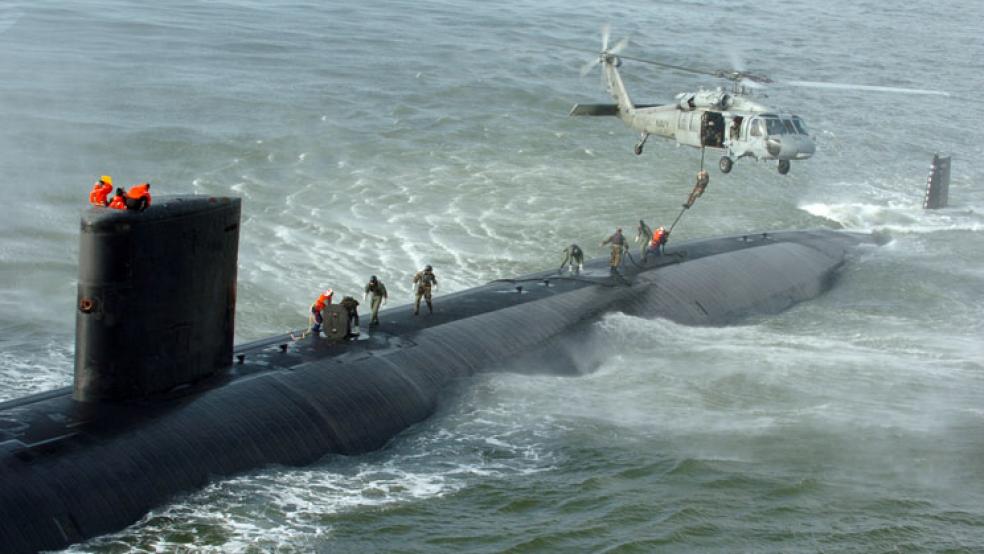Mounting ethical scandals may cost the U.S. military more than its reputation.
Navy officials last week said they’re prepared to pay for further investigations into the recent allegations of cheating and corruption within their ranks. Those remarks came on the heels of a similar scandal in the Air Force that prompted Defense Secretary Chuck Hagel to order two reviews of nuclear weapons personnel.
On Friday, Hagel said that in the coming weeks each service will announce what steps it is taking to deal with the scandals. He also said he would assign a general officer to coordinate those efforts who will report directly to Hagel.
Related: You Won’t Believe Who’s Cheating the Government Now
"This is an inter-service issue," Hagel said at a Pentagon press briefing to underscore the gravity of the situation. "This is an issue that cuts across all lines and all commands. And that's why I am putting this as a number-one priority for this institution."
Thanks to congressional budget action late last year that suspended the sequester, the Pentagon has dodged another round of automatic spending cuts after absorbing $39.6 billion in savings in fiscal 2014. But a surge in military investigations of widespread ethical misconduct potentially could substantially eat into the Pentagon’s operating expenditures.
The latest Navy imbroglio involves accusations that senior enlisted Navy personnel cheated on written tests required to certify instructors in a nuclear propulsion training program. While the Navy said it doesn’t foresee the need for further funding at this point, officials stressed that they’re ready to provide the resources if needed.
“If there is any need to fund additional evaluations – and we’ll figure that out – we’ll fund that,” Adm. Jonathan Greenert, chief of Naval operations, said last Tuesday at a Pentagon press briefing.
Related: Scandals Rampant Among Brass While Soldiers Die
Last month Air Force Secretary Deborah Lee James said that 92 of 183 commissioned officers responsible for operating missile silos at Malmstrom Air Force Base in Montana were involved in cheating on a monthly proficiency exam. That led to the reviews ordered by Hagel.
“He [Hagel] definitely sees this as a growing problem, and he's concerned about the depth of it,” Pentagon Press Secretary Rear Adm. John Kirby said last week.
The expanding nature of the scandals is already evident. Adm. John Richardson, director of the Naval Nuclear Program, estimated last week that nearly 20 nuclear engineering watch supervisors would be implicated in the test-cheating scandal. The Navy later said that 30 of the 150 supervisors in the Naval Nuclear Propulsion force have been barred from Joint Base Charleston in South Carolina.
The Army is also dealing with fraud charges. An ongoing investigation has shown that abuse of a National Guard recruitment program may have cost as much as $100 million and involved at least 1,200 individuals.
Related: Military Sexual Assaults Cost More than $872 Million
The program paid National Guard members, retirees and civilians to recruit friends and family, but had virtually no safeguards or controls. A Senate subcommittee chaired by Sen. Claire McCaskill (D-MO) held a hearing on the matter last week.
Depending on the ultimate scope of the scandals, Hagel, a former Republican senator from Nebraska, could find himself under enormous pressure from Congress to repair the damage done to the military’s reputation.
Lawmakers could zero in on the scandals and other systemic problems this spring, when Congress takes up the annual defense authorization bill.
The appropriations process is another potential platform for Democrats and Republicans to vent their concerns. Lawmakers displeased with how the Defense Department handles sexual assaults have used the power of the purse to change the Pentagon’s prosecutorial policies.
The $1.1 trillion omnibus spending bill signed into law last month by President Obama directs the Pentagon to implement recommendations from the Pentagon’s Office of Inspector General for improving the collection of evidence associated with sexual assault cases. The massive spending measure, which funds government operations through Sept. 30, included $156.5 million for Sexual Assault and Prevention Office services and additional funding for special victims programs.
Tim Homan is a Washington freelance writer
Top Reads from the Fiscal Times:


